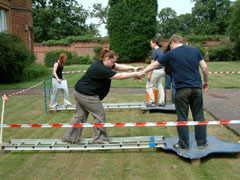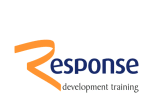Practical and Experimential Learning
 planning and evaluation
|
All of our programmes place great emphasis on exploring the principles of good management practice using experiential based methods of learning.
Experiential learning has a number of benefits and advantages over conventional training methods:
- It focuses on individuals, which enhances the process of self managed learning
- Cerebral, physical or creative exercises can be used, embracing all learning styles providing something for everyone
- By engaging in unfamiliar tasks from the person's everyday work experience, the usual preoccupation with the task outcome is removed
- Being away from the workplace in a safe, structured learning environment people have more freedom to try new and different things and learn from their mistakes!
- The use of tasks which are unfamiliar and often challenging which helps reduce the distorting effect of organisational relationships on behaviour
- It provides powerful visual images, capturing valuable moments of insight and self discovery in a mental picture which may then be carried back to the workplace
 Leading by Example
|
These factors combine to create the profound impact required to take the learning process beyond an intellectual understanding of ideas, toward actual changes in behaviour. In the final analysis, this is the essential of any development programme.








